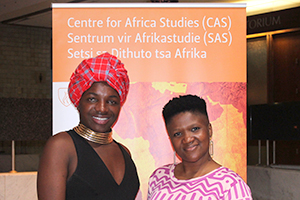
Vuyo Mbutho, winner of the best dressed
traditional wear, and Palesa Mokubung,
acclaimed fashion designer.
Photo: Siobhan Canavan
There is no such thing as overnight success. You need to earn your way to the top through hard work, which is exactly what critically acclaimed fashion designer Palesa Mokubung did.
During the 2016 Heritage Day lecture hosted by the Centre for Africa Studies, entrepreneur, award winner and fashion visionary Mokubung told how she had begun her career with the label Stoned Cherrie. Kroonstad-born Mokubung then formed her own label in 2004 called Mantsho, which is Sesotho for “brutally black”.
A true Mantsho garment can be identified by three elements that describe Mokubung’s knowledge of her craft, namely its confident and effortless silhouette, structure and quirkiness. “I was taught to express myself from a very young age and my job is to give people life through my clothes,” she says.
Under the management and creative leadership of Mokubung, Mantsho has gone on to travel to places such as Greece, India, New York, Jamaica, Nigeria, Botswana, and Senegal showcasing its designs.
Mokubung says she does not look far for inspiration because she lives in such exciting times. “Sometimes the fabrics talk to you and you should listen to them.”
This confident, straight talker with her high standards says that all aspiring fashion designers need to earn their way to the top. “You get over it by getting over it, and by working through it.”